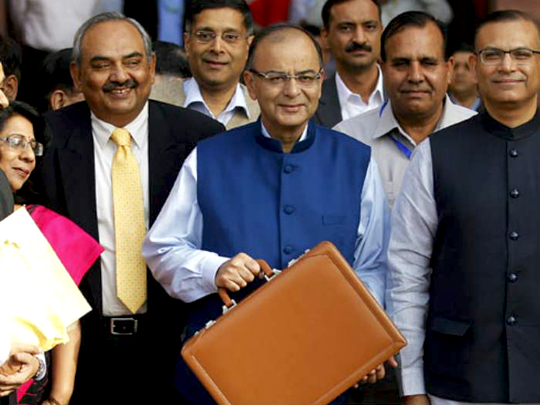New Delhi, Feb 29: Finance Minister Arun Jaitley faces a tough task of balancing the needs of farm sector as well as the industry when he presents his third and challenging Budget Monday as he seeks to garner resources to boost public spending for higher growth amid global headwinds.

On the income tax front, the Budget may continue with the status quo on the tax slabs while it may tinker with the exemptions.
Rising rural distress because of back-to-back droughts have put considerable pressure on the Finance Minister to spend more on social schemes, while at the same time he has to win back foreign investors craving for faster reforms.
His difficulties have been compounded by the huge payout of Rs 1.02 lakh crore that will become necessary on account of the 7th Pay Commission recommendations for government employees.
How much he does this without compromising on the previously-announced goal of lowering the fiscal deficit to 3.5 per cent of the GDP next year is to be seen.
Jaitley is also likely to fulfil his last year's promise of gradual reduction of corporate tax from 30 per cent to 25 per cent over four years.
It is expected that he may begin the exercise in the Budget tomorrow that may be accompanied by withdrawal of tax exemptions to keep the exercise revenue neutral.
To shore up revenues to meet the increased expenditure, the finance minister may need to increase indirect tax rates or introduce new taxes. Service Tax, raised to 14.5 per cent last year, may see a hike to prepare for the level of 18 per cent being envisaged in the GST.
Further, new cess to fund initiatives such as Start-up India or Digital India and other programmes is being speculated, similar to the Swachh Bharat cess levied last year.
On his agenda would also be the revival of the investment cycle. While capital expenditure in 2015-16 increased by 25.5 per cent over last fiscal, as a percentage of GDP it is still stuck at 1.7 per cent and needs to go up to 2 per cent.
He will have to steer spending towards sectors like infrastructure and raise public spending in view of private investment not picking up at desired pace
It remains to be seen if Jaitley will loosen his purse strings or continue to consolidate. In the event the government decides to increase spending, it would be a challenge to ensure that the funds are channelised into capital investments.
"Even if budgetary consolidation continues, India's fiscal metrics will remain weaker than rating peers in the near term," analysts at Moody's Investors Service said earlier this month.
Foreign investors have sold a net USD 2.4 billion in shares this year, the second-biggest outflows in Asia excluding China.
The Budget will need to focus on the commodity driven sectors by providing protection measures, since these sectors are stressed due to the collapse in global demand and oversupply.
Jaitley has shifted the proportion of expenditure toward infrastructure and away from subsidies in the last two Budgets.
Besides implementation of the 7th Pay Commission, he also faces challenge of bank recapitalisation.
With agriculture reeling from drought and lower crop prices, the government is likely to retain spending on the rural employment guarantee programme, expand crop insurance and boost irrigation outlays.
On reforms, he may open more sectors to foreign investment and give tax breaks for labour-intensive sectors such as leather and jewelry.
In view of sharp fall in crude prices and low probability of increase over the next one year, the government may reintroduce customs duty on imported crude, petrol and diesel, which was removed in 2011, when crude prices had increased over USD 100 per barrel.
The government could increase import duty on gold, since gold imports have increased over the year and has partly contributed to the trade deficit and weak rupee on account of forex outflows.






Comments
Add new comment